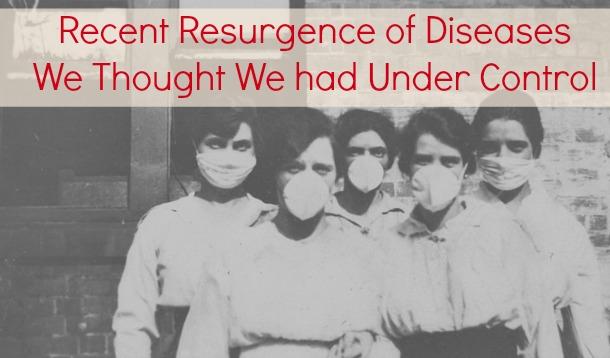
I diagnosed two patients last week with pertussis, otherwise known as "whooping cough." No, I didn't go through a time machine, and I wasn’t doing a skit. Both patients had previously been in excellent health, and they were young—university students, in fact.
We've been experiencing a resurgence of pertussis on Vancouver Island, where I live and work, and it’s not a good thing. Unfortunately, it’s part of a trend we’ve been seeing recently: the reappearance of old-world diseases that we used to have under some measure of control.
Robert Downey Jr.-esque comebacks may be cool in the entertainment industry, and retro is great if we’re talking about fashion. But when it comes to infections? No, thank you.
However, it’s important to know what we’re dealing with. Here are three diseases that are starting to rear their ugly heads again.
Mumps is a viral infection of the parotid glands. Here’s a picture of what it looks like when a kid gets mumps:

As unpleasant as that is, mumps might not be so awful if it stayed put in the parotid glands, but it often doesn’t. It can spread further and cause meningitis, encephalitis (inflammation of the brain), mastitis (breast inflammation), or oophoritis (ovary inflammation). Unlucky boys can get a condition called “mumps orchitis” which is basically a mumps infection in the testicles, which can lead to infertility.
The good news: cases of mumps were drastically reduced—by over 99%—since the MMR vaccine (measles, mumps, and rubella) was introduced in the 1960s.
Which was great.
In 1998, a controversy surrounding the vaccine was first sparked in a research report that had significant flaws. While it was officially discredited in 2010, the damage was done. Years of fear about the MMR vaccine had taken root in the public’s consciousness. Rates of vaccination have been declining ever since.
Now, we’re starting to see the fallout of all that. There’s a whole generation of kids growing up unprotected against diseases we once had a chance of controlling. Hence, outbreaks.
We don’t have a cure for mumps. If you or your kids get mumps all we can do is support the immune system, wait it out, and try to deal with any complications as they arise. That’s why prevention is really our best weapon.
Pertussis, or whooping cough, is a respiratory infection caused by the bacteria, Bordetella pertussis. Its cough has a distinctive sound. Typically what happens is a fit of coughing that either ends in vomiting, or in the characteristic high-pitched “whooping” intake of breath. Can’t quite imagine it? Check this website to listen to a sound of a kid with whooping cough.
Trust me, after hearing it, you will never want to hear that sound coming from your own child.
The other problem with pertussis is the length of the disease. We colloquially call it “The 100 Days Cough”—because that’s really how long it lasts. Yes, if you get pertussis, there’s a good chance you’ll be coughing for about three months.
And while many adults will have a milder—if not annoying and prolonged—version of the illness, pertussis can be very dangerous, even fatal, in infants and children.
Children with pertussis have a decreased ability to cough up the glue-like secretions that fill their airways. About 20-30 per cent of infants less than 12 months old with pertussis have to be admitted to the hospital because they’re having so much trouble breathing.
Before the vaccine, in the early 1900s, pertussis killed 5 out of every 1,000 children born in the United States before their fifth birthday. In the 1940s, 147,000 cases were reported in the US every year. Then we developed a vaccine, and those numbers plummeted. In 1976, there were just over 1,000 cases reported in the entire US.
Unfortunately, we’ve been experiencing a resurgence in recent years. In 2010, a whooping cough epidemic swept through California. When all was said and done, over 9,000 cases of the illness had been reported, and 10 people had died. Worldwide, there are about 20 to 40 million cases of pertussis, and 400,000 deaths each year. In Canada, between 1,000 and 3,000 people get sick with pertussis each year.
Measles is an infection whose name probably sounds somewhat familiar and that’s because virtually everyone used to get it. However, just because it was once common doesn’t mean it’s harmless.
Measles is a truly nasty infection.
For starters, it’s highly infectious. As many as 90 per cent of susceptible people become infected. It causes a high fever and a feeling of misery, and then the rash appears.
This is what it looks like:

Complications are common, from ear infections and pneumonia to more serious things like encephalitis (inflammation of the brain). Measles carries a high fatality rate: in developed countries it causes death in three of every 1,000 cases. We currently have no cure for measles.
In the 1960s a vaccine was created, and rates of measles plummeted. The World Health Organization (WHO) declared measles “eliminated” from the Americas in the year 2002. But before we go patting ourselves on the back we’ve started to see outbreaks cropping up in Canada.
This year saw a cross country outbreak with over 200 cases in Fraser Valley, British Columbia. Prince Edward Island has six cases of the measles, Calgary has four, southern Alberta has 42 (going back to last fall), Ottawa has two and Toronto has seen 24 cases of the measles, despite issuing travel warnings. This prompted Public Health officials to issue a plea for vaccination; nearly all cases were unvaccinated. Why is this happening? Because the rates of vaccination have been decreasing, as a consequence of the fears surrounding the MMR vaccine.
According to the WHO, if vaccinations were stopped, each year, about 2.7 million measles deaths worldwide could be expected.
A month ago I tested a young man for mumps. When I told him of my concern, his eyes went wide. He had no idea what “mumps” even was...but he did not like the sound of it. That’s a common theme—many people, particularly members of younger generations, haven’t even heard of these diseases.
And, let’s face it, that’s the very heart of the problem.
Today's generation of parents did not live through what previous generations did. They didn't witness polio outbreaks, which would flash through communities like prairie fires—killing some kids, leaving others paralyzed for life. Previous generations of parents didn’t need to listen to a recording of a kid with whooping cough to know what it sounded like, because they had heard it with their own ears.
Immunization is arguably one of the greatest success stories of modern medicine. The lives saved are currently estimated at 9 million annually. The disability, strife, and illness prevented is beyond estimation, but that success story ends up being its own public relations enemy.
Now that it's time for us, the current generation of parents, to either buy into vaccination, or not, we just don't have the personal experience to help us understand what is really at stake.
But I’m still hoping today’s parents will decide, as a group, that we do not want these diseases to come back. We may not have experienced them first-hand, but we’ve heard about them, and quite frankly, we do not like the sound of them.
Prevention is within our power.
 Multi-tasking moms juggle hundreds of things a day but you don’t want to drop the ball when it comes to your child’s immunization schedule. Here's more info to help you de-mystify vaccinations:
Multi-tasking moms juggle hundreds of things a day but you don’t want to drop the ball when it comes to your child’s immunization schedule. Here's more info to help you de-mystify vaccinations:
![]() Read how to keep on top of your child's immunization schedule.
Read how to keep on top of your child's immunization schedule.
![]() Watch this webisode to learn why parents of children with asthma need to pay special attention to their child's vaccination schedules.
Watch this webisode to learn why parents of children with asthma need to pay special attention to their child's vaccination schedules.
![]() Watch this webisode to learn the Myths vs. Facts about vaccination.
Watch this webisode to learn the Myths vs. Facts about vaccination.
For more info about this event and to learn more about diseases that can be prevented through immunization, talk to your pediatrician, or visit URImmunized.ca.

This is proudly sponsored by our friends at URImmunized.
www.urimmunized.ca